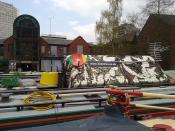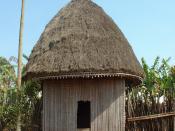In the years leading up to the Age of Imperialism, Cameroon was relatively primitive. The first known people to inhabit the area of Cameroon were the pygmy Baka people. They were replaced by the Bantu tribes and absorbed into the Bantu culture. Of a religious point of view, a powerful Islamic movement in the country largely replaced traditional native beliefs. Christian missionaries also began to have some influence later on, with the coming of Europeans. Fernao do Po was the first European to reach the shores of present-day Cameroon. He gave Cameroon its name, Camarao the Portuguese word for prawns, which there was an abundance of in the Sanaga River. Following him were slave traders who set up ports at the colonies of Bimbia and Douala to name a couple. Bamileke, Bamoum and other kingdoms farther inland provided the slaves available for trade. In the 1800s the slave trade declined and instead trade of goods and produce grew, specifically in the trade of natural rubber.
There was influence from many countries along the coast, with none managing to penetrate the interior due to malaria, however successful trade companies being implemented resulted in the colonization of Cameroon. Gustav Nachtigal on behalf of Germany set sail for Cameroon and obtained a treaty of chiefs from the coastal region asking for German protection.
In the beginning natives had wanted a protectorate because it would ensure them safety from the slave trade and other foreign powers and guarantee peace among the tribes. Conflict arose however, with the strong desire the natives had to control their monopoly of trade with the interior. The Germans knew that direct trade with the interior would be more profitable so they tried to penetrate farther inland. Aside from how difficult it was to travel inland, the...


